

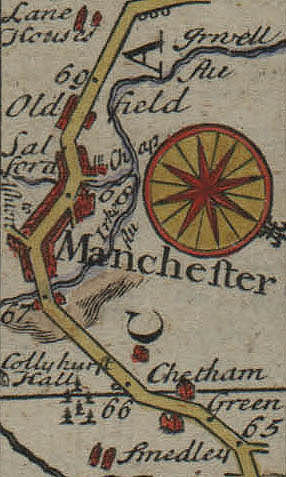
The strip map, opposite, is the forerunner of today's road map. It dates from 1720 and still shows Manchester with a very small area of built-up up land surrounded by open country. However, the accompanying description tells a somewhat different story. "Manchester is at this day one of the largest and most trading inland towns in the North of England, being very noted for its cottons or fustians and many other manufactures known by the name of Manchester Wares. It was so populous many years ago that about 20000 Comunicants were computed in the Town. Its Collegiate Church built in 1422 is a very large and stately fabrick."
In the 18th century, Manchester became a convenient commercial centre for the cotton mills that had sprung up in the city and the towns that surrounded it. The Manchester area was ideal for the textile trade, having a humid atmosphere and a good supply of soft water. The area's rivers also provided water-power to run the machinery in the mills.
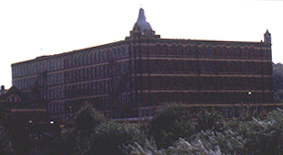
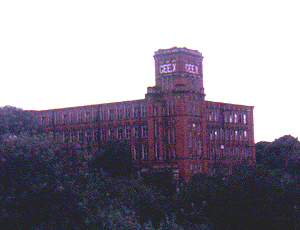
The availability of coal and the transportation system of roads, railways and canals all contributed to Manchester's growing reputation as a manufacturing and commercial centre.
The opening in 1894 of the Manchester Ship Canal further added to this role. Around the docks in Trafford Park electrical, chemical and manufacturing companies congregated. Manchester Liners brought wheat from Canada and flour mills were built.
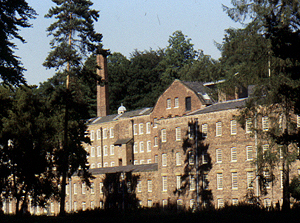
 |
||||||||||
 |
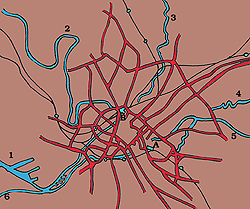
|
 |
||||||||
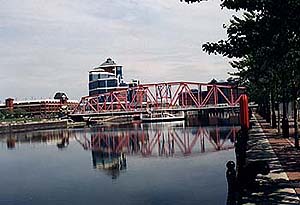 Today, the Manchester Ship Canal is a quiet
stretch of water with a future that is more recreational than
commercial. The warehouses are gone or are being converted into
up-market lofts. Condominiums and recreational centers surround
the Salford Quays along with the glass and steel structures of
the new e-conomy.
Today, the Manchester Ship Canal is a quiet
stretch of water with a future that is more recreational than
commercial. The warehouses are gone or are being converted into
up-market lofts. Condominiums and recreational centers surround
the Salford Quays along with the glass and steel structures of
the new e-conomy.
The city centre is undergoing one of its most extensive redevelopments courtesy of the I.R.A. and buildings old and new are being relocated, redeveloped or redeployed. Out in the east of the city close to the Velodrome the Commonwealth Games stadium is finally rising out of the muddy, redevelopment land. There are those who claim that Manchester is a truly European city, a modern, forward thinking and exciting city linked once again by a tram system that is the envy of many other cities.
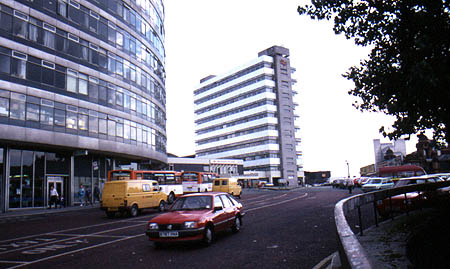
Mike Harding once quipped that as the result of a horrible accident Manchester's chief planner had been savaged to death by his guide dog and having lived in Manchester and with Manchester for 50 years I tend to agree with the point of that joke. It seems that every time someone tries to improve the Manchester city centre they create another eyesore. Every time they redevelop a community they spawn another monster that is unfit for human habitation. The first assault on Piccadilly in the 1960s left the city with the Picadilly Plaza and the tower above it that has effectively scarred the area for nearly 30 years. They took Market Street which was an interesting collection of Victorian buildings and built the Arndale Centre, the world's largest outdoor men's lavatory. Just to add insult to injury they added a bridge across the street to provide access to this commercial gem and cut off the light, the views and created the darkest, dingiest area I have run into in the center of a large city. It isn't that there aren't buildings to swank about but let's face it they are few and far between and some of the finest are standing unoccupied and neglected - those that haven't already been demolished to build another MacDonald's.
However, to characterize a city by its architecture alone is to miss the point. Manchester isn't York, it isn't Durham, Oxford or even London. It is an honest, hard-working, northern industrial city. It has a rich history that its inhabitants can be proud of and the country and the world are better places because of the famous and ordinary Mancunians who added to the scientific, industrial, commercial and, especially, the arts world. The country and the world thought it was a joke when the city entered bids to host the Olympic Games and the London comedian Jack Dee suggested that the reason it didn't beat out Sydney was the fact that some people thought that daylight might be an advantage in mounting the events. However, to paraphrase Colin Shindler, the author of "Manchester United Ruined My Life", when I'm asked where I live I have to say Canada, but when I'm asked where I'm from I'm proud to say Manchester.
 |
|